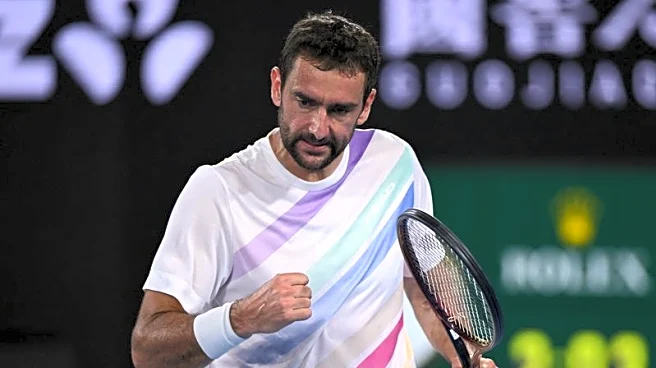What's Happening?
Pope Leo XIV, marking six months as pontiff, is preparing for his first foreign trip to Lebanon and Turkey at the end of the month. Despite concerns about safety due to regional tensions, Pope Leo has
confirmed his plans to proceed with the visit. This decision comes after a conversation with Queen Rania of Jordan, who questioned the safety of traveling to Lebanon. Pope Leo's response, captured by a hot mic, was a confident affirmation of his travel plans. The visit is part of Pope Leo's efforts to establish his own path and style as the new leader of the Catholic Church, following his unexpected election in May.
Why It's Important?
Pope Leo's upcoming visit to Lebanon is significant as it underscores the Vatican's commitment to engaging with regions experiencing political and social unrest. Lebanon, currently facing challenges such as Hezbollah's rearmament and ineffective oversight mechanisms, is a focal point of regional instability. Pope Leo's visit could potentially influence diplomatic relations and provide moral support to local communities. Additionally, his actions reflect a continuation of Pope Francis's legacy, focusing on social justice and ecological issues, while also addressing new challenges. The visit may also impact the Catholic Church's role in international diplomacy and its approach to global conflicts.
What's Next?
As Pope Leo prepares for his visit, the Vatican is likely to engage in diplomatic discussions to ensure the safety and success of the trip. The visit may prompt reactions from political leaders and civil society groups in Lebanon and Turkey, potentially influencing regional dynamics. Pope Leo's interactions with local communities and leaders could lead to new initiatives or collaborations aimed at addressing social and economic issues. The visit may also serve as a platform for Pope Leo to articulate his vision for the Catholic Church's role in global affairs, potentially shaping future Vatican policies and priorities.
Beyond the Headlines
Pope Leo's visit to Lebanon could have deeper implications for the Catholic Church's engagement with the Middle East. It may highlight ethical and cultural dimensions of the Church's involvement in regions with complex political landscapes. The visit could also signal a shift in the Vatican's approach to addressing global conflicts, emphasizing dialogue and reconciliation. Additionally, Pope Leo's actions may influence the Church's long-term strategies for promoting peace and stability in volatile regions, potentially leading to new partnerships and initiatives.











